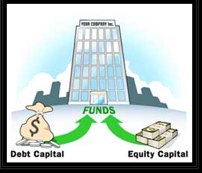There has been no shortage of controversy and criticism around the convertible note, a popular investing vehicle that’s used by seed stage and angel investors. As a refresher, a convertible note is a loan that automatically converts into equity upon the closing of a Series A round of financing. Sometimes these loans have a valuation cap and/or a discount. Although these types of notes are relatively easy and cheap to form, many have argued that these types of vehicles are not startup-friendly for a variety of reasons, which we’ll explain below. Today, TheFunded.com and the Founder Institute is announcing in conjunction with law firm Wilson Sonsini, Convertible Equity, a startup-friendly seed-financing vehicle intended to replace Convertible Debt notes.
TheFunded.com and the Founder Institute founder Adeo Ressi tells us that the Convertible Equity vehicle provides a fast, cheap and flexible way for angel investors to invest money in a startup, that converts to equity at the time of a future round. The point, he says, is to avoid time-consuming valuation negotiations and allowing a variable amount of capital to be raised.
It’s helpful to outline the problems with the convertible debt note first. The reason why many have started using the debt note, is because with no complications, an average convertible debt deal can be sealed with a five to seven page legal agreement that takes just a few hours to finish, and costs $5,000 or less.
Ressi estimates that the debt note now accounts for over 50% of all angel and early stage deals. He claims that anecdotal evidence suggests that there are as many as 30,000 startups carrying as much as $50 billion in convertible debt today.
But here are some of the cons when it comes to using convertible debt.
First, with convertible debt, startups generally have to pay simple (not compounded) interest on the amount of the loan. But with many investors in a seed round whose note starts at different times, calculating these interest payments and schedules can be complicated for the startup. Second, the debt note requires a fixed due date (or “maturity date”) for repayment of the total amount borrowed, plus interest. As lawyer Scott Edward Walker wrote earlier this year, because of this “Convertible notes are ticking time bombs: if the maturity date is reached, and there hasn’t been a Series A round (triggering the automatic conversion of the notes into shares of preferred stock), there is the potential for disaster.”
Ressi also says that the percentage of companies with convertible debt that successfully raise Series A funding is shrinking, due to an explosion in new angel financings and just moderate growth in venture funding. So if a startup doesn’t raise a Series A round within 12-18 months, it may be required to repay the loan with interest. If the startup can’t repay the loan, it will be in default under the note; in which case, the noteholders may force the company into bankruptcy (if the startup can’t renegotiate with investors to extend the loan).
Other issues with convertible debt, explains Ressi, include the fact that most angel investors are not licensed lenders, and licensing is complex, expensive, and varies by state. And a startup holding hundreds of thousands to millions of dollars of debt on their books is bad for business, particularly for lines of credit and big partnerships.
In the end, Ressi says that Convertible Equity allows startups and investors to have their cake and eat it too. It retains the most popular features of Convertible Debt but does not saddle startups with debt.
Basically, Convertible Equity removes the repayment at maturity and interest provisions of Convertible Debt. Additionally, Convertible Equity is “equity” that may have a lower capital gains tax benefit for investors, since it is likely classified as “qualified small business stock”.
Ressi states, “Convertible debt has provided startups with a fast and easy way to secure seed-financing, but the sheer size of the debt created is troublesome both for individual startups, and the startup ecosystem as a whole. It’s about time we take the best qualities of Convertible Notes, but eliminate the debt risk.”
Yokum Taku, Corporate and Securities Partner at the Palo Alto, California Office of Wilson Sonsini agrees, “I can’t think of a good reason not to shift early stage seed financings toward convertible equity away from convertible debt.”
Ressi, Wilson Sonsini and a top-tier accounting firm (which preferred not to be named) have been working on developing this set of documents for some time now, says Ressi. They are completely free for startups and investors to use (and are embedded below, and can be found on TheFunded).
Photo Credit/22dollars
